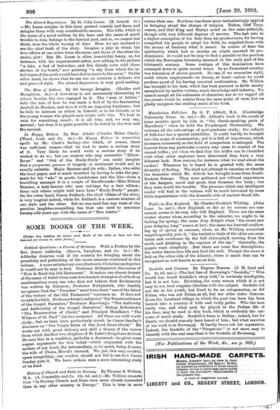• Sordello and Cunizza. By Eugene Benson. (J. M. Dent
and Co. 2s. 6d. net.)—The last line of Browning'a "Sordello," "Who would has heard Bordello's story told," is certainly intelligible, but it is not true. Browning, for some reason which it is not easy to see, took singular liberties with his subject. Sordello did not die in his yputh, but lived to be an octogenarian, as did Palma, who was not Palma at all, but her elder sister Cunizza. Even the Lombard village in which the poet was born has been turned into a country of hills and rocky paths. Who the man really was, and what part he played in the Italian life of his time, may be read in this book, which is evidently the out- come of much study. Sordello's fame is Italian; indeed, but for Dante, we should scarcely have heard of him ; but what survives of his work is in ProvencaL It hardly bears out his reputation. Indeed, the Sordello of the "Purgatorio" is not more easy to identify with the real man than is the Sordello of Browning.










































 Previous page
Previous page